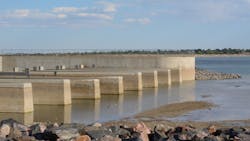Colorado finalizes 2023 Water Plan
The Colorado Water Conservation Board (CWCB) unanimously approved the finalized 2023 Colorado Water Plan.
First released in 2015, the Water Plan provides a comprehensive framework to guide collaboration from water partners, agencies, and Colorodans. From securing supplies that provide safe drinking water to improving farm irrigation and rehabilitating streams, the 2023 Water Plan targets specific, key actions to contribute to water resilience.
“In Colorado, water is life,” says Colorado Governor Jared Polis. “Colorado’s Water Plan sets a vision for vibrant communities, successful farming and ranching, thriving watersheds, and climate resilient planning. I’m excited to see how the updated plan supports a more resilient future here in Colorado for years to come.”
The 2023 Colorado Water Plan builds on the pioneer plan of November 2015. In recent years, water conservation efforts have decreased statewide per capita water use by 5 percent, water outreach and messaging reached 2.7 million people, and in 2019 Colorado voters passed Proposition DD to dedicate funding for the Colorado Water Plan grants program.
“We are excited about this much-anticipated update. Seven years ago, the CWCB released the original Water Plan — and now, guided by state-of-the-art data and innovative tools, the 2023 Plan puts Colorado’s values into a set of actions that tackle the specific challenges and opportunities of our state,” says Becky Mitchell, CWCB’s director. “The 2023 plan will spark the action we need across all sectors to build a better water future in Colorado, setting the stage for future decision-making and water resiliency.”
The 2023 update reframes actions into four key areas: Vibrant Communities, Robust Agriculture, Thriving Watersheds, and Resilient Planning. Within these four areas, a list of approximately 50 actions for partners and 50 actions for the state aim to address themes such as equity, climate resilience, water conservation, land use, education, and more.
The Water Plan Grant Program welcomes projects and programs that fall in five major funding categories: Water Storage and Supply, Conservation & Land Use, Engagement & Innovation, Agricultural projects, and Watershed Health & Recreation.
Throughout the development of the Colorado Water Plan, CWCB says that engaging with the public has been critical. The team conducted a year-long public engagement phase, hosted a public comment period, held workshops, and encouraged Coloradans to share their own water conservation success stories and commit to action through a water conservation pledge.
In total, the public comment period yielded over 528 pages of comments, 1,597 suggested edits to the plan and more than 2,000 observations. Comments came in a variety of formats including letters, emails, survey responses, feedback at events, and public listening sessions. Of those comments, about 60 percent were either already captured in the plan or were addressed by modifying the draft plan.
“I congratulate the Colorado Water Conservation Board, staff and all the Colorado water stakeholders who contributed to the 2023 Colorado Water Plan,” says Dan Gibbs, executive director of the Colorado Department of Natural Resources. “The Plan provides an important vision and roadmap for Colorado’s water future which faces increased challenges from climate change, population growth and changing water demands.”
